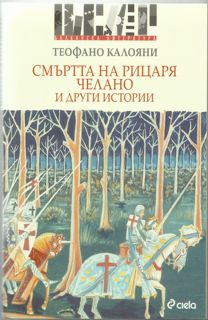Photos: the author
Zdravka Mihaylova
Exclusively for GRReporter
A literary gathering at Plovdiv University brought Greek writer of Plovdiv descent Theophano Kalogianni to this town on three hills, the ancient Trimontium. Translator Zdravka Mihaylova presented Kalogianni's story collection The Death of the Knight Celano and Other Stories (Ciela Publishing House, 2013). The book is dedicated to the author’s grandmother (whose name she bears) who was born in Plovdiv in 1906 and died in Thessaloniki in 1975, "in the hope that she will learn about it." The cover of the Bulgarian edition is illustrated with a drawing of the knight Celano and his retinue, by the author.
Theophano Kalogianni not only cherishes the stories of her Plovdiv grandmother and her four sisters, all of them converted Jews who emigrated from Tsarist Russia, but also re-animates them in the preface of the book that she wrote especially for its Bulgarian edition: "... since I was a child I have been constantly listening to her, speaking about that magical place, Filipoupoli, with its phaetons and dances, about her cousins from Odessa, their vacations in Varna, their meetings, engagements, dowry of French lace, affluence and prosperity. All the good things were there and then, and all the trouble was here and now. The Tahchievi sisters who had already accepted the Greek name Stavrou ("stavrós" in Greek means cross), being true and zealous proselytes, did not discuss hard times and wars, but their afternoon walk... Kalogianni writes, "This is how I learned about our home on the hill with the Roman amphitheatre, the house with the curved eaves and the attic rooms with ghosts, about the Jewish grandfather, a cloth merchant who had taken his wife Olga to the international exhibition in Paris in 1900, but ultimately had not taken her to the top of the Eiffel tower, for which omission Olga had been reproaching him until his very last day; I learned about the French lessons, now completely forgotten, as well as about the first bob haircuts and the drop-waist dresses."

In his review of the book in Kultura newspaper Bulgarian literary critic Marin Bodakov wrote, "Little Kalogianni overheard next door the various memories of her grandmother and her sisters from the beginning of the world, and she turns them into myths, apocrypha, hagiographies, sagas, stories... The holy scripture comes to life through the eyes of an astonished and wise child. We could read the short stories in The Death of the Knight Celano as a reprise of F. Scott Fitzgerald’s The Curious Case of Benjamin Button; while dying, the character gets the chance to live out his days in reverse, correcting three mistakes to bitterly establish that he, a ruler and murderer, will remain in the memory of mankind just as an image in the immortal Giotto fresco”. "Important dead persons such as dukes, popes and Maecenas stand out at their funerals. However, important living persons are buried informally, sometimes coming back to life after a few years. And from then on they become incontestable," says Kalogianni.
The Death of Knight Celano and Other Stories, inspired by the eponymous fresco by Italian painter Giotto, seamlessly combines different narrative genres, including myth, fairy tale, chronicles, story and parable. The linguistic imagination of the author intertwines joy with unexpected melancholy, creating a bizarre world laden with all the gifts of fabulous storytelling (knights, wizards, king's sons, princesses, gods, talking animals, teratomorphous plants and paintings that come to life, wars, sacrifices and pilgrimages) presented in a language that brings sharp surprises.
Theophano Kalogianni was born in Thessaloniki in 1967 but grew up in Sweden, where her parents were immigrants during the dictatorship of the colonels. After the repatriation of her family she studied conservation of art works, Byzantine music and sculpture; she also has an interest in palaeography. Today she lives in Athens, where she translates from Swedish, Norwegian and English. She has pursued many professions, from chanter of Byzantine hymns and icon-restorer, to singer of songs in the rebetiko style. She tries to write only when, in her words, she cannot do anything else. Her authorial biography shows that she has just four books published. She turned to literary expression aged twenty with the novella The Death of the Knight Celano (Estia Publishing House, 1988), which was awarded the Kostas and Eleni Ouranis prize of the Athens Academy (1991) for a debut fiction author. Her collection of short stories Tales from the Scriptures (Okeanida, 2001) appeared thirteen years after her first book. Critical opinion defined her as a "child prodigy" because of her youth and the fact that she uses the Greek language in a refined manner, although she did not attend Greek schools until she returned to her homeland.
For you the visit to Plovdiv was a kind of pilgrimage and homecoming. During the meeting with the audience at which we presented the Bulgarian edition of the stories, you said you are "a person of the past." What did you mean?